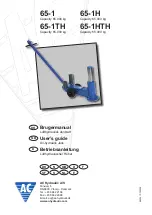
Sheet No.
Issue Date: Rev. C March 19, 2012
© 2003 SPX
Operating Instructions
1. Close the release valve by turning the handle clockwise (CW) as far as it will go.
2. Position the jack under the vehicle.
IMPORtANt:
Use the manufacturer’s recommended lifting points
on the chassis.
3. Pump the jack handle to raise the saddle to the contact point.
4. Check the placement of the jack; the load must be centered on the jack saddle.
IMPORtANt: Avoid wheel
obstructions such as gravel, tools, or uneven expansion joints.
5. Finish lifting the vehicle by pumping the handle. Do not attempt to raise the jack beyond its travel stops.
6. Place approved support stands under the vehicle at points that will provide stable support. Before making
repairs on the vehicle, lower it onto the support stands by SLOWLy and CAReFULLy turning the handle
counterclockwise (CCW).
Parts List & Operating Instructions
Form No. 522982
Preventive Maintenance
IMPORtANt: the greatest single cause of failure in hydraulic units is dirt.
Keep the service jack clean
and well lubricated to prevent foreign matter from entering the system. If the jack has been exposed to rain,
snow, sand, or grit, it must be cleaned before it is used.
1. Store the jack in a well-protected area where it will not be exposed to corrosive vapors, abrasive dust, or
any other harmful elements.
2. Regularly lubricate the moving parts in the wheels, arm, and handle.
3. Replace the oil in the reservoir at least once per year. To check the oil level, lower the lift arm completely.
Remove the rubber filler plug. Oil level should be at the bottom of the filler plug hole. If necessary, add
approved anti-wear hydraulic jack oil, and install the filler plug.
IMPORtANt: the use of alcohol, hydraulic
brake fluid, or transmission oil could damage the seals and result in jack failure.
4. Inspect the jack before each use. Take corrective action if any of the following problems are found:
a. cracked, damaged housing
c. leaking hydraulic fluid
e. loose hardware
b. excessive wear, bending, other damage
d. scored, damaged piston rod
f. modified
equipment
5. Keep warning labels and instructional decals clean and readable. Use a mild soap solution to wash external
surfaces of the jack.
3 of 3























